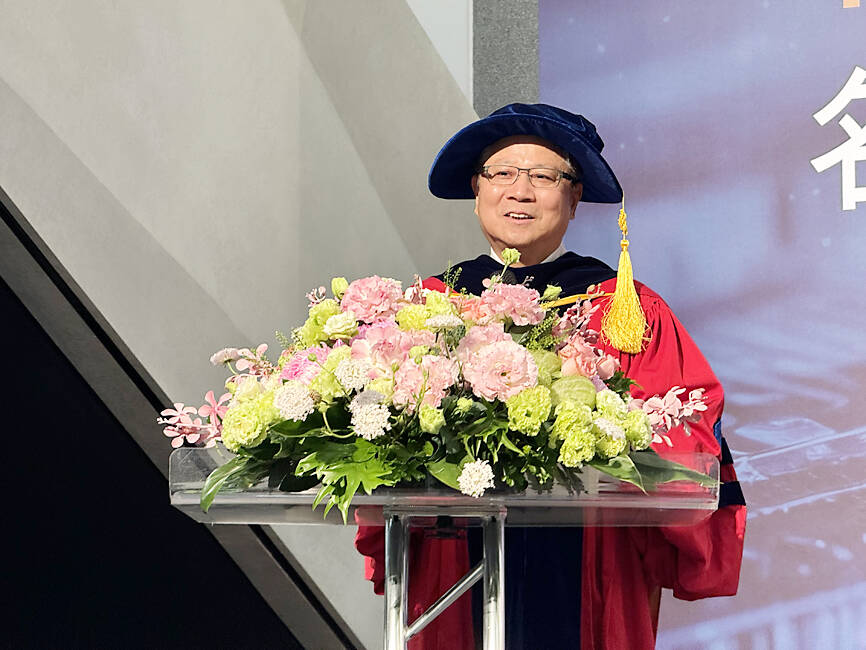Artificial intelligence (AI) has become a must-have tool for businesses to increase productivity amid drastic changes in markets and the environment, Wistron Corp (緯創) chairman Simon Lin (林憲銘) said at a panel discussion at National Yang Ming Chiao Tung University after receiving an honorary doctorate.
“I’m not an expert in AI, but our company has adopted AI in its operations and I feel deeply that AI is an integral part of the business,” Lin said. “Without utilizing the power of AI to double or triple an employee’s working capabilities, a business would face difficulties in handling enormous changes in markets, technology and the environment.”
Likewise, AI technology would play a crucial part in allocating production lines promptly and taking countermeasures when geopolitical tensions spell trouble for manufacturers, Lin said.

Photo: CNA
Wistron is a primary supplier of AI modules and AI chip baseboards to Nvidia Corp, Advanced Micro Devices Inc and Intel Corp.
Benefiting from the AI boom, the company’s shares more than doubled last year and have risen 28 percent since the beginning of this year, closing at NT$120.5 in Taipei yesterday.
Lin said AI also helps enhance productivity and partly solve workforce shortages.
The headcount of Wistron and its subsidiaries would be less than 70,000 at the end of this month, compared with 150,000 in 2011, while its consolidated revenue has increased to almost NT$1 trillion (US31.3 billion) compared with NT$600 billion in 2011, he said.
However, scarcity of talent remains a headache for Wistron and most companies given a low birthrate in Taiwan, as firms continue to expand the scale of their businesses and globally deploy, Lin said.
As a result, creating a bigger talent pool with different expertise would be vital for Taiwan to seek long-term growth and to safeguard its core position in the technology industry, he said.
To that end, the government should make bolder decisions and become more open about recruiting talent overseas, Lin said, adding that Japan has relaxed its rules on introducing overseas talent over the past few years, a move that was unimaginable for the nation in the past.

The New Taiwan dollar is on the verge of overtaking the yuan as Asia’s best carry-trade target given its lower risk of interest-rate and currency volatility. A strategy of borrowing the New Taiwan dollar to invest in higher-yielding alternatives has generated the second-highest return over the past month among Asian currencies behind the yuan, based on the Sharpe ratio that measures risk-adjusted relative returns. The New Taiwan dollar may soon replace its Chinese peer as the region’s favored carry trade tool, analysts say, citing Beijing’s efforts to support the yuan that can create wild swings in borrowing costs. In contrast,

Nvidia Corp’s demand for advanced packaging from Taiwan Semiconductor Manufacturing Co (TSMC, 台積電) remains strong though the kind of technology it needs is changing, Nvidia CEO Jensen Huang (黃仁勳) said yesterday, after he was asked whether the company was cutting orders. Nvidia’s most advanced artificial intelligence (AI) chip, Blackwell, consists of multiple chips glued together using a complex chip-on-wafer-on-substrate (CoWoS) advanced packaging technology offered by TSMC, Nvidia’s main contract chipmaker. “As we move into Blackwell, we will use largely CoWoS-L. Of course, we’re still manufacturing Hopper, and Hopper will use CowoS-S. We will also transition the CoWoS-S capacity to CoWos-L,” Huang said

VERTICAL INTEGRATION: The US fabless company’s acquisition of the data center manufacturer would not affect market competition, the Fair Trade Commission said The Fair Trade Commission has approved Advanced Micro Devices Inc’s (AMD) bid to fully acquire ZT International Group Inc for US$4.9 billion, saying it would not hamper market competition. As AMD is a fabless company that designs central processing units (CPUs) used in consumer electronics and servers, while ZT is a data center manufacturer, the vertical integration would not affect market competition, the commission said in a statement yesterday. ZT counts hyperscalers such as Microsoft Corp, Amazon.com Inc and Google among its major clients and plays a minor role in deciding the specifications of data centers, given the strong bargaining power of

INDUSTRY LEADER: INDUSTRY LEADER: Taiwan Semiconductor Manufacturing Co (TSMC, 台積電), a major chip supplier to Nvidia Corp and Apple Inc, yesterday said it aims to grow revenue by about 25 percent this year, driven by robust demand for artificial intelligence (AI) chips. That means TSMC would continue to outpace the foundry industry’s 10 percent annual growth this year based on the chipmaker’s estimate. The chipmaker expects revenue from AI-related chips to double this year, extending a three-fold increase last year. The growth would quicken over the next five years at a compound annual growth rate of 45 percent, fueled by strong demand for the high-performance computing